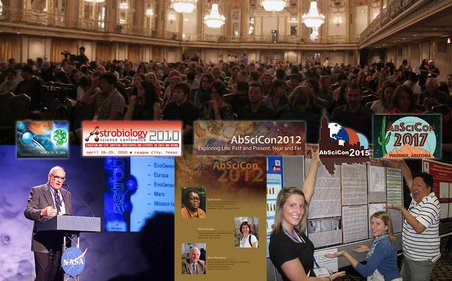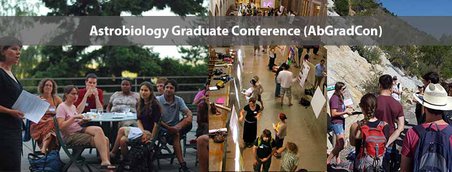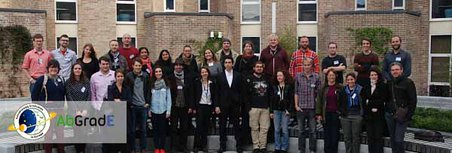-
Conferences and Schools
February 2, 2018Conferences

Astrobiology Science Conference (AbSciCon)
The Astrobiology Science Conference series is organized by the astrobiology community, convening scientists from all over the world who work in the interdisciplinary field of astrobiology — the study of the origin, evolution, distribution, and future of life in the universe — to report on research findings and plan future endeavors.
Astrobiology Graduate Conference (AbGradCon)
The Astrobiology Graduate Conference provides a unique setting for astrobiologically-inclined graduate students and early career researchers to come together to share their research, collaborate, and network. Participants and keynote lecturers of the first AbGradE symposium in 2014. Photo courtesy AbGradE, Baptiste Journaux
Participants and keynote lecturers of the first AbGradE symposium in 2014. Photo courtesy AbGradE, Baptiste JournauxAstrobiology Graduate EANA Conference (AbGradE)
AbGradE provides a unique setting for astrobiologically-inclined European graduate students and early career researchers to come together to share their research, collaborate, and network.Schools

The XVII School of Astrobiology: From Astrochemistry to the Origin of Life
The 17th Astrobiology Summer School will connect the fundamental aspects of astrochemistry, prebiotic chemistry, and the origin of life. The students will attend lectures given by experts in these fields, will prepare and present a group project, and will participate in an excursion to a relevant geological site near Santander. The schools is primarily aimed at graduate students in science or engineering, but is open to anyone interested in the origin of life and astrobiology.NASA’s 31st Annual Planetary Science Summer Seminar
The Planetary Science Summer Seminar prepares the next generation of engineers and scientists to participate in future solar system exploration missions. Participants learn the mission life cycle, roles of scientists and engineers in a mission environment, mission design interconnectedness and trade-offs, and the importance of teamwork.SCK•CEN Space Summer School
For more than 15 years, SCK•CEN plays an important role in the pioneering research to enable future human space exploration, for example to the Moon or Mars. We are actively contributing to several space flight experiments as well as numerous Earth-based space analogs.The Space Summer School is a multidisciplinary and international learning event for highly-motivated PhD students, early-stage researchers and professionals from a diverse range of educational and professional backgrounds (biomedical scientists, physicists, (bio-)engineers, …), with an interest in life sciences and physical & medical health challenges associated with human space exploration. It combines theoretical classes, practical exercises and technical visits in several domains related to space research and development.
NOAA-NASA Satellite Meteorology Summer School
The NOAA National Environmental Satellite, Data, and Information Service (NESDIS) and the NASA Earth Sciences Division are pleased to announce a Satellite Meteorology Summer School on the theory and use of Satellite Data to engage graduate students and individuals with early postdoctoral appointments in the science of developing and using satellite data for the atmosphere, land, oceans, and cryosphere. The program will include internationally recognized experts in radiative transfer theory, satellite meteorology, numerical weather prediction at both the global scale and mesoscale, along with opportunities for students to interact with the lecturers in an informal setting. The objective of the program is to foster the education of the next generation of satellite meteorologists and promote the use of observations from the latest operational and research satellite missions.
Josep Comas i Sola International Summer School in Astrobiology
The Josep Comas i Solà International Astrobiology Summer School is co-sponsored by NAI and the Centro de Astrobiologia. Held annually in Santander, Spain, it has become a tradition in the astrobiology community. The week-long program for graduate students and postdoctoral fellows provides lectures from international experts, round-table discussions, student projects, night-sky observations, and a half-day field trip to a nearby site of astrobiological interest.MBL Microbial Diversity Summer School
This course is an intensive six-and-a-half-week research and training experience for graduate or postdoctoral students, and established investigators, who want to become competent in microbiological techniques for working with a broad range of microbes, and in approaches for recognizing the metabolic, phylogenetic, and genomic diversity of cultivated and as yet uncultivated bacteria.International Geobiology Summer School
The International GeoBiology Course is an intense, multidisciplinary summer course exploring the coevolution of the Earth and it’s biosphere, with an emphasis on how microbial processes affect the environment and leave imprints on the rock record.Biosignatures and the Search For Life on Mars
The summer school “Biosignatures and the Search For Life on Mars”, held in Iceland, aims to cover the subject of the search for life in different environments, both on early Earth, below Earth’s surface and on Mars. It will bring together students and researchers from a multitude of different fields. It is co-organised by the Nordic Network of Astrobiology, the European Astrobiology Campus, and the EU COST Action “Origins and Evolution of Life on Earth and in the Universe”. Field studies on the colonisation of lava fields and Mars analogue landscapes will complement the lectures.Volcanism, Plate Tectonics, Hydrothermal Vents and Life
The course aims to give participants a thorough introduction into influence of volcanism, plate tectonics on life and the role of hydrothermal vents in the upcome of life. It is co-organised by the European Astrobiology Campus and the COST Action Origins and Evolution of Life in the Universe. Lurdes Dapcevicius (University of the Azores) and Wolf Geppert (Stockholm Uiversity) will function as course organisers.
- Astrobiology Science Conference (AbSciCon)
- Astrobiology Graduate Conference (AbGradCon)
- Astrobiology Graduate EANA Conference (AbGradE)
- NOAA-NASA Satellite Meteorology Summer School
- Josep Comas i Sola International Summer School in Astrobiology
- MBL Microbial Diversity Summer School
- International Geobiology Summer School
- Biosignatures and the Search For Life on Mars
- Volcanism, Plate Tectonics, Hydrothermal Vents and Life